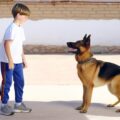
28 Feb Pit Bulls With Kids: What You Need to Know
Imagine pit bulls as powerful engines, capable of great things when handled with care.
When it comes to pit bulls with kids, understanding their dynamics is key.
But what happens when the unexpected occurs?
Stay tuned to discover essential strategies that can make all the difference in fostering a harmonious relationship between these loyal canines and your little ones.
Temperament and Behavior Traits
When considering pit bulls and their interaction with children, understanding their temperament and behavior traits is crucial for fostering a safe and loving environment. Pit bulls are renowned for being loving family dogs and excellent companions for children. They exhibit loyalty and affection towards their human family members, especially when raised and trained well from a young age. As a pit bull puppy grows, positive reinforcement training methods can help instill good behavior and manners, making them even more suitable as family pets.
These dog breeds often excel in temperament tests, surpassing many other family breeds, highlighting their good-natured disposition. Their natural protectiveness can be channeled positively when guided through training. By providing pit bulls with proper care, socialization, and consistent training, they can form strong bonds with children. This bond not only offers companionship but also teaches kids valuable life lessons in empathy, compassion, and responsibility. Pit bulls have the potential to be gentle, loving, and loyal members of a family when given the right environment and guidance.
Training Pit Bulls Safely
To ensure safe interactions between pit bulls and kids, it's crucial to train pit bulls safely, starting with early socialization and consistent discipline.
Pit bulls have high energy levels, so keeping training sessions short and engaging will help maintain their attention. Consistency is key when teaching basic commands such as look, come, stay, and recall. These commands not only establish boundaries but also encourage positive behaviors around children.
Positive reinforcement, like treats and praise, should be used to reward good behavior during training sessions. Avoid using negative reinforcement as it can hinder the learning process.
By starting training early and focusing on positive reinforcement, you can help your pit bull develop good behaviors that will ensure a safe and enjoyable relationship with kids.
Ensuring a Safe Environment
Creating a safe environment for pit bulls and kids requires vigilant supervision to prevent any potential accidents or misunderstandings. Proper training and socialization of your pit bull are essential in fostering a secure and harmonious atmosphere for children.
Ensure that your home has secure fencing and containment measures in place to guarantee the safety of both your dog and the children. Be aware of any specific laws in your city or country that target pit bulls to minimize risks and enhance community safety.
It's crucial for pit bull advocates to advocate for non-discriminatory laws that focus on behavior rather than breed to promote a fair and safe environment for everyone involved. By staying informed and proactive, you can create a space where both your pit bull and children can thrive happily and safely together.
Introducing Pit Bulls to Children
For a successful introduction of pit bulls to children, prioritize supervision to ensure safety and foster positive interactions. When bringing dogs and children together, it's crucial to teach kids how to approach pit bulls gently and respectfully. Begin in a calm setting to observe the pit bull's behavior around children. Look for any signs of aggression or discomfort in the dog, and be ready to intervene if needed.
Reward good behavior and give the pit bull space when interacting with kids.
Building Trust and Bonds
When aiming to build trust and bonds between pit bulls and children, consistency in training, positive reinforcement, and a safe environment are key elements to focus on.
Here are some essential tips to help you foster a strong relationship between bulldogs and kids:
- Positive Reinforcement: Reward good behavior with treats or praise to encourage positive interactions.
- Safe Environment: Ensure all interactions between children and pit bulls occur in a secure and supervised setting.
- Play and Socialization: Allow time for play and socialization to promote a healthy and happy bond.
- Affection: Show affection to both the pit bull and the child to create a loving and trusting atmosphere.
- Consistent Training: Stick to a routine and be consistent in your training methods to establish clear boundaries and expectations.
Frequently Asked Questions
Are Pit Bulls Safe to Have Around Kids?
Pit bulls can be safe around kids with proper training, socialization, and supervision. Understand their temperament, address safety concerns, teach child interaction, prioritize behavioral training, debunk breed misconceptions, enforce positive reinforcement, meet exercise needs, and integrate them into the family.
What Are Some Interesting Facts About Pit Bulls for Kids?
Pit bulls have playful personalities that make them great companions for kids. Training tips are essential for their socialization skills. Understanding pit bull myths and their history can foster lasting bonds and promote exercise.
What Is the Best Pitbull for Kids?
When looking for the best pitbull for kids, focus on playful companions who are child-friendly, energetic playmates. Seek breeds with loving, protective qualities. Ensure socialization, obedience, and positive experiences for active kids.
How Do You Train a Pitbull to Be a Family Dog?
To train a pitbull as a family dog, use positive reinforcement, consistent boundaries, and socialization skills. Teach obedience through playful activities, family bonding, and proper exercise. Implement a reward system, supervise interactions, and maintain clear communication for success.








No Comments